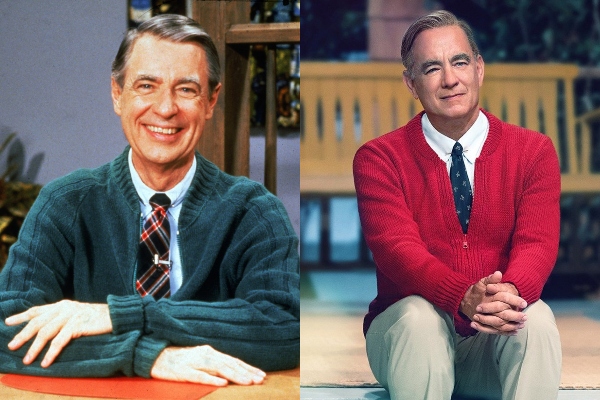Fred Rogers, the creator of Mister Rogers’ Neighborhood, is an iconic figure in American culture. Many of us grew up watching the cardiganed, compassionate man day after day as children. As adults, we’ve come to appreciate his ethos of kindness, love, and acceptance even more as the world seemingly devolves into bitter Twitter feuds. Filmmakers have taken notice of the Mister Rogers fandom, and released two films about the so-called children’s televangelist: the 2018 documentary Won’t You Be My Neighbor? and the 2019 dramatization A Beautiful Day in the Neighborhood. Though these movies appear on the surface to observe the same subject, they do so through vastly different lenses. If you’re only going to watch one Mister Rogers movie, which one should it be? We’ll break it down in this Mandatory Movie Battle.
Cover Photos: Tremolo Productions and TriStar Pictures
Hello neighbor: ‘Won’t You Be My Neighbor?’ Will Remind You to Be a Bit More Neighborly
Casting central: 8 Reasons Why Tom Hanks Playing Mr. Rogers Makes it ‘A Beautiful Day in the Neighborhood’
While both films are excellent, Won’t You Be My Neighbor? is the definitive depiction of who Fred Rogers was and how he changed the landscape of children’s television through Mister Rogers’ Neighborhood. The documentary has more depth and breadth than the dramatization, and the authentic footage of Rogers simply can’t be replicated by Hollywood.
While A Beautiful Day in the Neighborhood is a heartfelt film, it fixates too much on Vogel – a character that viewers never really come to care about – and follows a generic narrative arc that results in a pat conclusion. Audiences want to know more about Mister Rogers, not a sour journalist who is “not a fan of humanity.” The dramatization is still worth seeing for Tom Hanks’ incredible (and likely Academy Award-winning) performance, which will have you feeling all the feels. If you’re only going to watch one Mister Rogers movie, go for the documentary. If you can see both, do, because they each provide distinct experiences that’ll leave you inspired to be a better person.
Overall Winner: Won’t You Be My Neighbor?
Follow Mandatory on Facebook, Twitter, and Instagram.
Mandatory Movie Battles Mister Rogers
-
Story

Won’t You Be My Neighbor? follows Rogers throughout his life. The documentary touches on his illness-riddled childhood, his initial foray into television with The Children’s Corner, his departure to seminary, the creation of Mister Rogers’ Neighborhood, his failed pivot to adult programming, and his death.
A Beautiful Day in the Neighborhood is told from the point of view of a cynical Esquire journalist, Lloyd Vogel (Matthew Rhys), who is assigned to cover Rogers for the magazine’s hero issue. This film puts Rogers in supporting character status, focusing primarily on the way Vogel was transformed through his interactions with the television celebrity over a brief period of time.
For Rogers fans, this is no contest: the documentary is a deep dive into all of Rogers’ facets, while the dramatization is concerned more with a cookie-cutter narrative arc about celebrity and those who consume it.
Winner: Won’t You Be My Neighbor?
-
Drama

Won’t You Be My Neighbor? is a quietly affecting film. While it addresses dark topics, the drama is contained. The most outrageous it gets is when a Mister Rogers' Neighborhood crew member shares his story of a mooning prank he played with Rogers' camera.
A Beautiful Day in the Neighborhood goes for almost Hallmark movie level drama in the life of its lead character, Lloyd Vogel. New fatherhood, marital tension, family violence, health crises, a trippy dream sequence – there’s a lot going on in the dramatization, and it leaves viewers completely unsure what will happen next but eager to find out.
Winner: A Beautiful Day in the Neighborhood
-
Emotional Impact
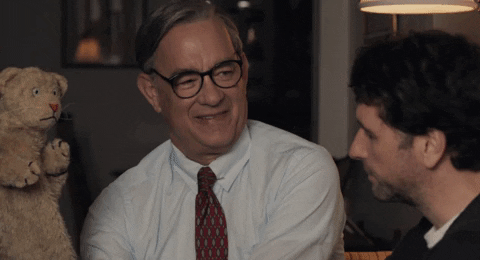
Fred Rogers had an ability to elicit emotion like no other. It was as if he could see through people but didn’t judge them. He made a safe space for people’s vulnerability and encouraged them to share their feelings. Both the real Fred Rogers and the Tom Hanks version exhibit these talents onscreen, making for many tear-jerking moments in both films. When Rogers (in both documentary and dramatized versions) introduces an exercise of taking a minute to silently think of a person or people who "loved you into being," it’s near impossible not to get choked up. But somehow, A Beautiful Day in the Neighborhood tugs at the heart strings more than the dry, intellectual approach of Won’t You Be My Neighbor?, even if at times the former feels manufactured.
Winner: A Beautiful Day in the Neighborhood
-
Politics
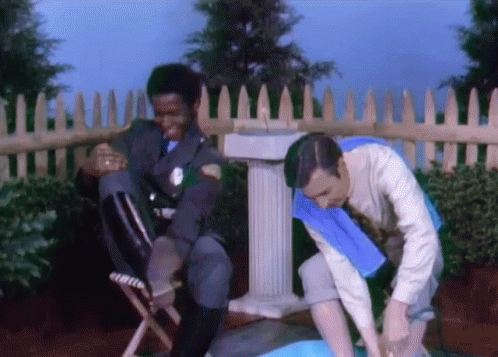
Hard to believe, but true: Mr. Rogers was a radical. He addressed topics that other children’s programs wouldn’t dare touch. In Won’t You Be My Neighbor?, viewers see how he took current events like the Vietnam War, John F. Kennedy’s assassination, the Space Shuttle Challenger explosion, and 9/11 and deconstructed them on air for young audiences. The documentary also shows footage from Rogers’ testimony before the U.S. Senate, which secured $20 million in funding for public television.
A Beautiful Day in the Neighborhood doesn’t even touch on the ways Rogers rebelled against popular culture or used his program to address injustices like segregation because it's too busy fawning over him. A Beautiful Day in the Neighborhood also completely ignores the backlash that dogged Rogers, while the documentary includes footage of cruel onscreen parodies, mean-spirited op-eds in major newspapers, and a shocking protest over Rogers’ tolerance of LGBTQ people.
Winner: Won’t You Be My Neighbor?
-
Spirituality
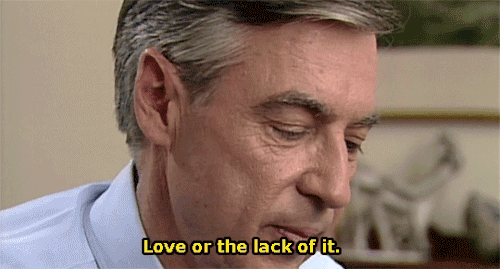
Because Won’t You Be My Neighbor? takes a big-picture view of Rogers, it includes parts of his life that A Beautiful Day in the Neighborhood just doesn’t address, like the fact that Rogers was a Presbyterian minister. Rogers’ philosophy behind his programming was deeply rooted in Christian theology, from the biblical mandate of “love thy neighbor” to the (apparently controversial) idea that every human being has inherent value. In effect, Rogers was ministering to children and adults through the way he interacted with them.
A Beautiful Day in the Neighborhood only acknowledges Rogers’ spiritual side in passing a few times, and makes no mention of the strong foundation of faith that informed and motivated Rogers' behavior.
Winner: Won’t You Be My Neighbor?
-
Miniature Models
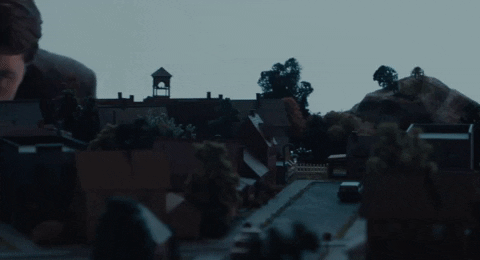
While Won’t You Be My Neighbor? offers close-ups of the models used on Mister Rogers' Neighborhood, A Beautiful Day in the Neighborhood indicates location changes with a vast array of miniature models that go beyond the land of make-believe. From the skylines of New York City and Pittsburgh to a cemetery scene, the dramatization features intricate models that firmly center the viewer in the scene.
Winner: A Beautiful Day in the Neighborhood
-
Cute Kid Factor

Both films include plenty of kids that Rogers interacted with through his show. While Won’t You Be My Neighbor? has far more diversity in the children featured, A Beautiful Day in the Neighborhood includes a scene on a subway train where children sing Rogers' theme song to him. You'd have to have a heart of stone not to enjoy that. The dramatization also includes baby Gavin (Zoey, Jordan, and Naomi Harsh), which makes it the winner of this round.
Winner: A Beautiful Day in the Neighborhood
-
Ending
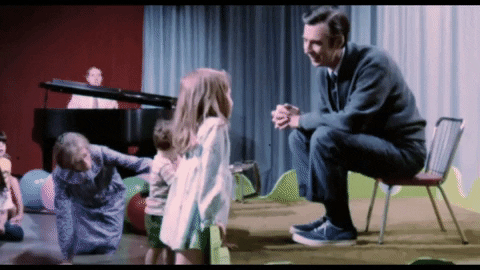
Won’t You Be My Neighbor? ends with Rogers’ death, followed by the aforementioned exercise of thinking about the person or people who loved you into being. Each of the interviewees pauses for a minute in contemplation before the camera. A few people share who they were thinking about. It’s a powerful ending, but not necessarily a happy one.
A Beautiful Day in the Neighborhood is a feel-good movie. Even when the tears are flowing, it’s the cathartic kind of crying. Vogel has transformed into a sensitive man with a new perspective on the importance of family. As for Rogers, he ends on a high note, quite literally, behind the keys of a piano, making beautiful music on set after a day of filming. Everything is just as it should be. It’s sweet, but it isn’t real life.
The ending you prefer may depend on whether you’re a Debbie Downer or a Pollyanna, but we prefer the complex picture of the documentary, where pain and joy are intertwined.
Winner: Won’t You Be My Neighbor?
